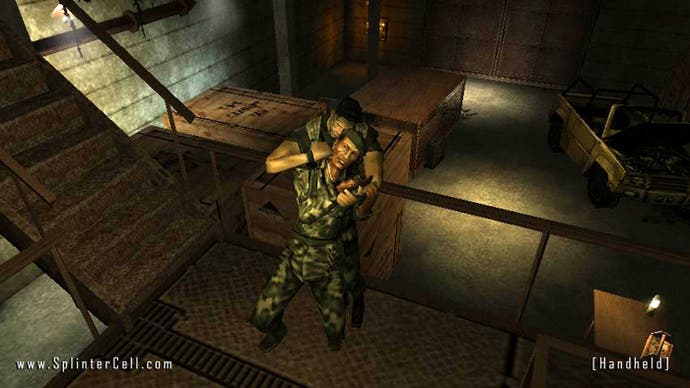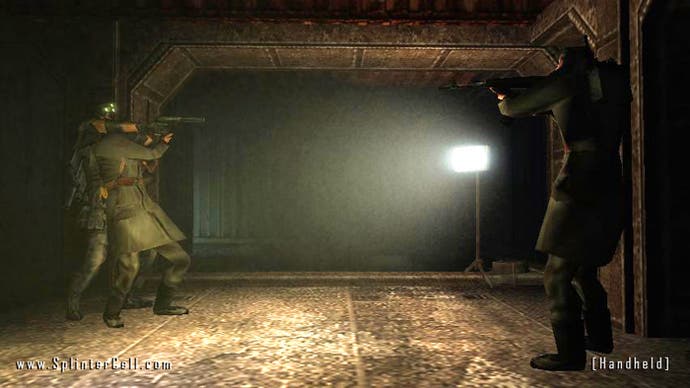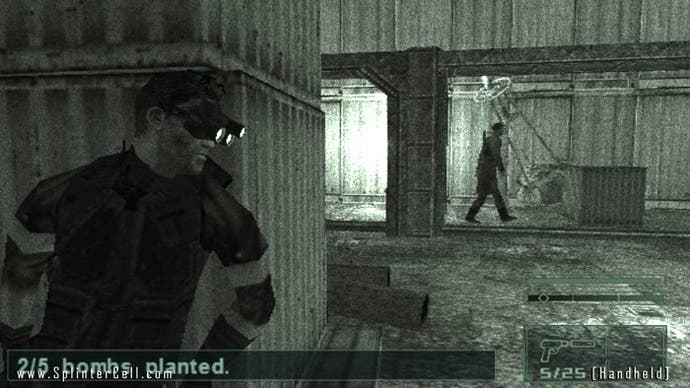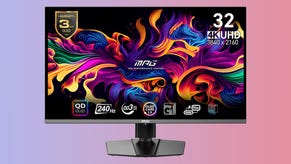Splinter Cell Essentials
Far from it, actually.
In the space of three home console releases, Tom Clancy's lone Special Forces agent has advanced the mechanics of a genre, coated it in incredible visuals and set a benchmark by which all stealth games are measured. Splinter Cell should never be mediocre; it should never be simply 'okay', it should never be anything less than fantastic. That's the bar it set itself, and that's the measure by which we judge all future iterations of the series. In that respect, Splinter Cell Essentials might come in the right packaging but it's not a Splinter Cell game.
Sam Fisher's first infiltration of the PSP is a collection of missions from previous games, as well as new content based on the upcoming console outing, Double Agent. The first problem is the fact that we've already played the majority of levels and when we last saw them on home consoles they were of a considerably higher quality. The watered-down PSP versions, with their dark levels populated by poor AI, are a noticeable drop in quality for the series. Obviously, we're not expecting the PSP version to look like it belongs on Xbox, but it should be pushing the capabilities of its own format.

To begin with, it's a familiar and welcome set up. Sam Fisher is skilled in all the moves we know so well, from dropping onto guards' heads, to close-quarters attacks, using enemies for human shields and that silly little mince from one side of a doorway to another. Weapons, gadgets and mini-games are how we left them too; those loveable goggles complete with the high-pitched activation whine are as comfortable as a knackered pair of sneakers, and light and sound meters help the player read the environment almost as well as using old-fashioned eyeballs.
But sight and vision is one of the biggest problems with Essentials. The analogue nub is used to move Fisher, but by holding down the circle button it's also used to move the camera manually, making it impossible to do both at the same time. The circle button on its own centres the view directly behind the Black Ops agent, but that's no use when you're moving with stealth and precision through an environment. With no way to control the camera and Fisher simultaneously, movement is an uncomfortable shuffle - move, stop, shift camera, move, stop, shift camera again. To make this even more of a chore, there's a second control system for when a weapon is drawn that uses the four face buttons to move and the analog nub to aim. So now we have two completely separate ways of moving, neither of which do a satisfying job.
Splinter Cell has always been a series about using the contrasting light and dark to your advantage, but Essentials is strain-your-eyes dark. It's dark to the point of being uncomfortable. Night vision goggles are your main gadget but you shouldn't have to wear them through entire levels, especially when they reduce textures, objects and basic shapes to fuzzy blurs. It's the lesser of two evils - goggles that make it difficult to distinguish distance and surfaces, or normal vision with poor lighting almost engulfed in a heavy, black cloak.

With the series' heritage, we'd expect Essentials to be one of the best-looking games on the PSP. While it has attention to detail in things like tent canvas, fauna, furniture and other objects, there's a bigger problem with a rude camera that barges through solid objects like some kind of visual gatecrasher. When Fisher puts his back against a wall the camera falls through it, revealing the empty space behind a model across half of the PSP's unforgiving widescreen display. We know Fisher's kitted out with near-future technology but he shouldn't have x-ray vision. Worst of all, during tight locations the camera zooms inside Fisher's head and you see his eyes staring back at you from the inside of his skull. It's like a beast from Silent Hill taking up the entire screen. Not only is it a distracting graphical glitch, it gets in the way of gameplay and screams 'shoddy technical skills' in your face like a bawling drill instructor.
So there goes Fisher, creeping through the shadows like a cat with three big green lights stuck to his noggin, when he comes across the enemy. Not that the enemy notices, because he's busy doing nothing with a basic AI that makes the majority of the game easy. It's possible to run through one level bursting into rooms and sticking a knife into guards for an instant kill. Shoot an enemy in the head and his buddy will run over to stand in the exact same spot. Blam, down he goes as well. There's no need to worry about how to navigate a room and slip past unnoticed. Just skewer the suckers and sprint to your goal. Even in locations where you're not given carte blanche it's possible to run up on enemies and drop them with a silent, non-lethal attack. During one level I opened a door three times, with it literally slamming back closed because a guard was standing on the other side. Was the terrorist bothered? No, he was too busy whistling.
Those responsible for the sound in Essentials at least come away with some dignity. As well as Ironside's awesome voice-like-a-tombstone, the incidental music sets the mood (although even this has a tendency to stop abruptly as though someone's unplugged the headphones), and sound effects are a nicely crisp contrast. Accidentally setting off a trip wire will make you jump at the explosion, and it's at times like this that Essentials manages to claw back some of the series' drama and breath-holding tension.

And finally there's a spy versus spy multiplayer option, which is almost completely pointless. Splinter Cell isn't a deathmatch kind of game now is it? It's a superfluous box-ticking addition and in practice amounts to two players stumbling around a warehouse trying to knife each other in the kidneys.
There are touches of the Splinter Cell we know. Creeping through the shadows should be a nerve-wracking experience, but when you know the guards are practically wearing blindfolds and earplugs, there's no need for caution. Animation is smooth with character models and objects that show an impressive attention to detail. But when the game and its separate elements start moving, flowing and interacting it falls apart. It's functional but not fun. The challenge of the game is testing for all the wrong reasons.
A Splinter Cell title should never be average, but that's exactly what Essentials is. Followers of the series will get something from the experience and possibly jump to defend it, but they're also the ones that are going to be the most disappointed and offended at how poorly thought out and unfinished the game feels. The camera never becomes comfortable and the graphical glitches are an embarrassment to the development team, the publisher and the player. Both Splinter Cell and the PSP should be able to offer us so much more than this. This is the worst title in the series so far.








